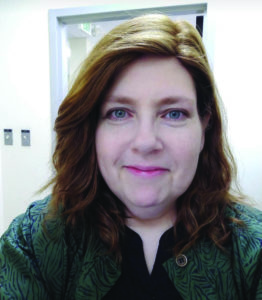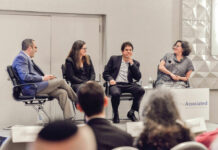
By Jesse Berman and Laura Farmer
When someone hears the word “autism,” what first comes to mind are likely the disadvantages associated with the condition. But Rachel Turniansky, the director of disability and inclusion services at the Macks Center for Jewish Education, knows that that’s not always the case.
“I have a friend that I work with who has an incredible ability to manipulate information based on the calendar,” said Turniansky, a resident of Pikesville and member of Suburban Orthodox Congregation Toras Chaim. “So if you tell him your birthday and your birth year, he will, first of all, remember that forever — and so he’s very helpful in terms of reminding you when some important date is coming up — as well as he can tell you what day of the week you were born on.
“He’s actually very good also at, because the Hebrew calendar and the English secular calendar do not line up, he’s very good at calculating when someone’s Hebrew birthday is coming, versus their English birthday,” Turniansky continued.
April is Autism Acceptance Month. While autism has at least the potential to endow people with unique strengths, this is not always the case, and testing for it early can be vital in helping those who have it deal with it.
Is it autism?

Many parents of young children may sense something is “off” with their developing child. But how can they tell whether the differences they notice are within the broad category of normal childhood development or something else? The first step is understanding what autism spectrum disorder, or ASD, is and is not.
“Autism is what we call a developmental disability, and so people with autism have problems with social, communication and behavioral challenges,” said Dr. Dana Silver, head of the division of general pediatrics at Sinai Hospital, who noted that those with autism tend to communicate, behave and learn in different ways than others. “We have some children who, again, are profoundly intellectually limited, and are unable to speak, who have very disruptive behaviors and have a really hard time sitting still, interacting with people. Many children with autism have sensory issues, and so they have trouble eating certain foods or textures, and so may be very restrictive in their diets.”
Silver emphasized that autism is a spectrum, however, and that children with autism can go on to college.
The importance of early diagnosis of ASD
Silver emphasized that early assessment and intervention can be crucial to helping children achieve better outcomes.
“The whole idea of early identification is that we can get them into early intervention,” said Silver, a resident of Towson who often attends High Holiday services at Congregation Beit Tikvah or Baltimore Hebrew Congregation. “The brain is the most plastic, and the most responsive to interventions, in the first few years of life. And so it is really critical to make that diagnosis, because we can get them into the support services and the programming and the behavioral interventions and all those things.
“We’re not going to cure autism, but we can help the child find better ways to communicate, help the child to learn social interactions, help the child with sensory issues be more comfortable with clothing or foods or other things,” Silver added.
Currently, autism is most commonly diagnosed between the ages of 18 months and 3 years, Silver said.
Assessing autism
For an autism assessment, parents should expect to meet over the course of a few days or weeks with a multidisciplinary team that includes child psychologists, speech-language pathologists, occupational therapists, child psychiatrists, nurse practitioners and behavior specialists who work together to provide accurate diagnoses.
Some of the possible signs of autism for a child under 12 months, Silver said, can include a lack of babbling, not making eye contact, not smiling or a lack of interest in looking at faces.
“Not automatic,” Silver stressed. “Maybe they have a vision problem. But again, those things may be a sign.”
For a child between 12 and 24 months, signs of autism can include not responding to social interactions, echoing what others say instead of displaying their own spontaneous speech or being overly attached to unusual objects, Silver said.
Next steps
Following the assessment, families will have a clearer picture of their children’s strengths and weaknesses and a plan for supporting them in achieving their potential.
“We try to tailor our treatment plan to each individual kid,” said Katelyn Kristina Vertucci, a psychologist and clinical director of the Swank Autism Center at Nemours Children’s Hospital. “We request that they get in touch with their local school district to see if they are eligible for any resources in their community, such as a preschool classroom specially designed for them. We also recommend parent training. It’s crucially important that caregivers work hand in hand with therapists so that a child’s progress is reinforced at home.”
Awesome on the autism spectrum
An autism diagnosis can overwhelm parents. But experts and parents can work together to help recognize the distinctive gifts of children on the spectrum.
“I would say that autism is a difference. It is a difference in learning style and approach to the world,” said Anne Inge, a psychologist and the clinical director of the Center for Autism Spectrum Disorders at Children’s National Hospital. “Children with autism have unique strengths. That’s part of the work we do — celebrating their strengths while building on areas that are weaker.
“People with autism have really contributed to our society,” Vertucci added. “Kids with autism tend to have strong interests in things they love and know every single detail about those subjects. For example, some of the most brilliant scientists in history, like Albert Einstein, are thought to have been on the spectrum.”







